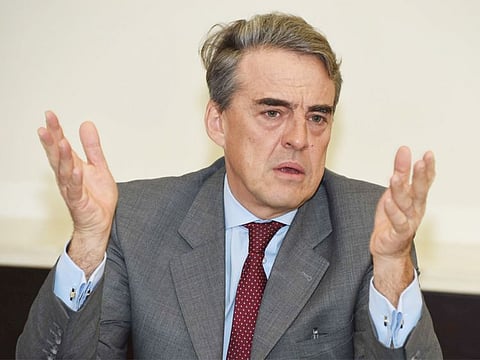UK measures for aviation post-Brexit not enough
IATA says it is concerned about flight disruptions in weeks following Brexit

Dubai: Measures taken by the United Kingdom to avoid disruptions in the aviation sector after the country leaves the European Union are not enough, the International Air Transport Association (IATA) warned on Thursday.
With Brexit now less than three months away, IATA said it is “not acceptable” not to be able to calibrate measures to ensure passenger and cargo connectivity. The contingencies that have been planned so far only cover as much traffic capacity from the UK as 2018, but do not account for any possible growth this year in flight volumes.
“I am not concerned that there will be a major disruption but I am concerned that there will be disruptions in the coming weeks and months because it has not been calibrated properly. Frankly, it’s stupid,” said Alexandre de Juniac, Iata’s director general and chief executive officer.
“If you have calibrated the growth at the level of 2018, and if the growth is more than zero compared to 2018, you will have disruptions, not perhaps immediately but in the weeks and months following because you will be above the ceiling.”
Between now and the Brexit deadline of late March, however, the UK and the EU may have covered more areas to ensure long-term connectivity for passengers.
Speaking at a media round-table in Dubai, de Juniac also discussed other challenges to the aviation industry in 2019, namely protectionism and infrastructure. So far, protectionism measures around the world including trade tensions and tariffs have not had significant impact on cargo flows, the CEO said, since some of the heavily-taxed goods such as aluminium and steel are not transported by air.
But protectionism will have economic consequences, IATA said, such as slowdown in trade and gross domestic products.
As for infrastructure, de Juniac said it is a challenge everywhere in the world, be it in the form of developing airports or air space management. The latter, he said, is “an enormous problem” in the Middle East where air traffic is heavily congested.
“Aviation is clearly a priority for this region …” he said, “And it’s a pity that the development of aviation that has been spectacular, that has brought prosperity, growth, development, international exposure to this region has slowed down by a problem of air space. We urge governments to cooperate to solve that issue.”
Asked if progress was being made by regulators in the region to ease air traffic congestion, de Juniac said, “Not really.”
Despite challenges in 2019, though, IATA expects “significant” growth in passenger demand, at a global average of 6 per cent. This is a lower than the 6.5 per cent growth rate in 2018 and is impacted by risks such as a potential global economic slowdown.
For the Middle East’s airlines specifically, growth is expected to be “a bit below [the] average,” de Juniac said, with the fastest growth rate forecasted in Asia.

![Pakistan Embassy and Consulate stress relying only on verified sources before travelling. [Illustrative image]](http://media.assettype.com/gulfnews%2Fimport%2F2024%2F01%2F11%2FStock-PIA_18cf721b120_large.jpg?w=320&auto=format%2Ccompress&fit=max)

